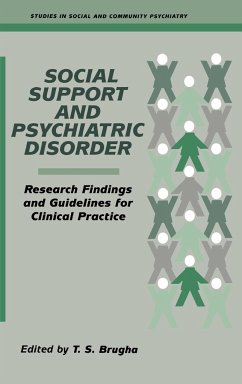This second volume, in a series looking at the social dimensions of mental illness, collates and critically examines the information currently available on social support as it impacts on mental health. The international team of contributors, each actively involved in both clinical and research work in this field, collectively covers the whole range of perspectives from biological mechanisms through to psychological and social theory. An overview of the latest published evidence and a description of the nature and origins of social support are followed by evidence from observational studies and specific interventions and trials. The text concludes with a summary which will act as a valuable resource for practitioners in their evaluation of social and psychological treatments, and should also serve to stimulate further research and intervention trials. Practitioners and researchers in psychiatry, psychology, and social work are certain to welcome this timely guide.
Table of contents:
1. Social support and psychiatric disorder: overview of evidence; Part 1. Concepts and Origins of Social Suport: 2. Understanding social support within the context of theory and research on the relationship of life stress and mental health; 3. A developmental perspective on support networks; 4. Cognitive aspects of social support processes; 5. Attachment, co-operation and rank: the evolution of the need for status and social support; Part II. Lessons from Selected Observational Studies: 6. Social support as a high risk for depression in women; 7. The importance of context: who needs, and who does not need, social support among college students?; 8. Teenage peer network structures in the community as sources of social problems: a sociological perspective; Part III. Lessons from Intervention Studies: 9. Social network and mental health-an intervention study; 10. A test of the social support hypothesis; 11. Case management and network enhancement of the long-term mentally ill; 12. Expressed emotion: measurement, intervention and training issues; Part IV. Intervention Principles and Recommendation: 13. Social support processes and cognitive therapy; 14. Social support and psychiatric disorder: recommendations for clinical practice and research.
This second volume, in a series looking at the social dimensions of mental illness, collates and critically examines current knowledge on social support as it impacts on mental health. From biological mechanisms through to psychological and social theory, this text will act as a valuable resource for practitioners in their evaluation of social and psychological treatments.
A critical evaluation of research into the impact of social support on mental health with implications for mental health management and intervention.
Hinweis: Dieser Artikel kann nur an eine deutsche Lieferadresse ausgeliefert werden.
Table of contents:
1. Social support and psychiatric disorder: overview of evidence; Part 1. Concepts and Origins of Social Suport: 2. Understanding social support within the context of theory and research on the relationship of life stress and mental health; 3. A developmental perspective on support networks; 4. Cognitive aspects of social support processes; 5. Attachment, co-operation and rank: the evolution of the need for status and social support; Part II. Lessons from Selected Observational Studies: 6. Social support as a high risk for depression in women; 7. The importance of context: who needs, and who does not need, social support among college students?; 8. Teenage peer network structures in the community as sources of social problems: a sociological perspective; Part III. Lessons from Intervention Studies: 9. Social network and mental health-an intervention study; 10. A test of the social support hypothesis; 11. Case management and network enhancement of the long-term mentally ill; 12. Expressed emotion: measurement, intervention and training issues; Part IV. Intervention Principles and Recommendation: 13. Social support processes and cognitive therapy; 14. Social support and psychiatric disorder: recommendations for clinical practice and research.
This second volume, in a series looking at the social dimensions of mental illness, collates and critically examines current knowledge on social support as it impacts on mental health. From biological mechanisms through to psychological and social theory, this text will act as a valuable resource for practitioners in their evaluation of social and psychological treatments.
A critical evaluation of research into the impact of social support on mental health with implications for mental health management and intervention.
Hinweis: Dieser Artikel kann nur an eine deutsche Lieferadresse ausgeliefert werden.








